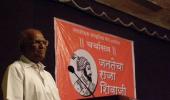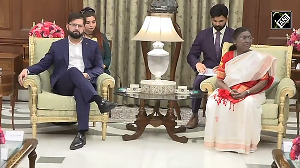 Chief Minister Devendra Fadnavis faces the challenge of ensuring that Dalits and Muslims -- who are likely to be most affected by the beef ban -- do not drift away towards the opposition.
Chief Minister Devendra Fadnavis faces the challenge of ensuring that Dalits and Muslims -- who are likely to be most affected by the beef ban -- do not drift away towards the opposition.
The recent ban on beef in Maharashtra has provoked angry reactions from both the Opposition parties as well as non-government organisations.
The Maharashtra Animal Preservation (Amendment) Act came into force from March 4, with the President giving his sanction to it. The Bill had been passed in 1996, when the Bharatiya Janata Party and the Shiv Sena were in power. It extends a previous ban on cow slaughter to bulls and bullocks.
Those caught violating the law face a five-year jail term and a fine of Rs 10,000, if convicted. Recently, the police registered a case for the first offence, against three people in Nashik district.
In neighbouring Goa, the BJP government has decided not to take any decision without taking all people concerned on board, including the Christian community, which comprises 38 per cent of the state's population.
In Maharashtra, the government's decision to ban the beef trade coincided with the scrapping of the five per cent quota for the Muslim community in jobs. The opposition has picked on this to attack the government. Chief Minister Devendra Fadnavis faces the challenge of ensuring that Dalits and Muslims -- who are likely to be most affected by the beef ban -- do not drift away towards the opposition.
Both the BJP and the Shiv Sena -- who fought the assembly elections separately but are partners in the government -- have often claimed that Dalits and Muslims, who each comprise 10 per cent of the electorate, voted for them in the assembly and Lok Sabha elections after deserting the Congress.
But now, some sections in the government believe that these two communities may move away from it unless it launches a comprehensive rehabilitation and development plan.
Opposition parties, on the other hand, are gearing up to take on the government on this issue during campaigning for the election to the Bandra assembly seat, slated for April 11, and polls to the Navi Mumbai and Aurangabad civic bodies on April 22.
Fadnavis and his ministers have been defending the government's decision, claiming that the ban on cattle slaughter has got nothing to do with religion, and the Congress and the Nationalist Congress Party in the opposition are giving a communal angle to it for political purposes.
The chief minister claimed that the economic interests of the people affected by the ban would be protected and they would be provided alternatives in the agriculture sector. His argument, however, has found few takers.
Beef traders also warn that while they will lose their jobs, the price of others meats in the state will also increase. Beef costs a third of mutton. Buffalo meat is largely exported and only 25 per cent of beef eaters consume it.
BJP's poll ally Swabhimani Shetkari Sanghatana has criticised the government's decision, threatening to launch a statewide protest. The other Dalit ally, the Republican Party of India (Athavale) group, has also said it will launch an agitation.
The Congress has been anaemic in its opposition, but the NCP, reviving its pro-farmer image, has claimed a blanket ban will cause enormous hardships for farmers who would now have to take care of old and sick cattle, instead of slaughtering them. The NCP has demanded the government put in place a mechanism to take care of unfit cattle.
Majlis-e-Ittehadul Muslimeen, which has won two assembly seats and launched a drive to consolidate its position across the state, has already declared it will reach out to voters in the coming civic polls.
The Commission on Dalits of the National Council of Churches in India has observed that the ban is an encroachment on the right of the citizens.
Some senior ministers and legislators from the ruling alliance admit that the ban on slaughter of bulls and bullocks will have to be looked at from the economic angle.
The new Act allows slaughter of water buffaloes, which provide carabeef -- generally seen as an inferior quality meat. The beef trade in the state is largely controlled by Muslims of the Qureshi caste, which is mulling legal action.
All India Jamatul Qureshi President Mohammed Rauf Quershi said, "The ban will render a lot of people associated with slaughtering jobless. In Mumbai alone, 75,000 kg to 90,000 kg beef is consumed daily, largely by poor people. The ban on the slaughter of ageing bullocks will create additional burden on the farmers."












 © 2025
© 2025